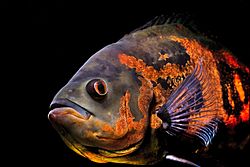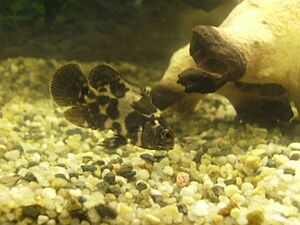Oscar (fish) facts for kids
Quick facts for kids Oscar |
|
|---|---|
 |
|
| Conservation status | |
| Scientific classification | |
| Kingdom: | |
| Phylum: | |
| Class: | |
| Order: | |
| Family: | |
| Genus: |
Astronotus
|
| Species: |
A. ocellatus
|
| Binomial name | |
| Astronotus ocellatus Agassiz, 1831
|
|
The Oscar (Astronotus ocellatus) is a cool type of fish that belongs to the cichlid family. People call them by many names, like tiger oscar, velvet cichlid, or marble cichlid. Their scientific name is A. ocellatus. These fish can grow quite big, up to 16 inches (40 cm) long, and weigh over 3 pounds (1.5 kg). Oscars are known for being smart and are popular as aquarium pets, but they can also be quite aggressive!
Contents
Where Oscars Live
The Oscar fish naturally lives in warm parts of South America. You can find them in countries like Brazil, Colombia, and Peru. They swim in the Amazon River basin and other big river systems there. Oscars like slow-moving rivers with white water. They often hide under tree branches that are underwater.
People have also brought Oscars to other places, such as India, China, and the United States. They are very popular as aquarium fish all over the world.
What Oscars Look Like
The Oscar is a large predatory fish. This means they hunt other animals for food. Their bodies are very colorful, often with dark and bright colors mixed together.
These fish can change their colors very quickly. Young Oscars look different from adult Oscars. Baby Oscars have stripes of white and orange. They also have spotted heads.
Oscar Behavior
The Oscar is an aggressive predator that comes from the Amazon River. Oscars like to create their own special areas, called territories. They will attack other fish that come too close to their space.
What Oscars Eat
Oscar fish are omnivores. This means they eat both plants and animals. In the wild, Oscars mostly eat slow-moving catfish. They use a special suction method to grab their food. Wild Oscars also eat shrimp, snails, and different kinds of insects. Sometimes, they even eat fruits and nuts when they are in season. Oscars need to get enough vitamin C to stay healthy.
If you have an Oscar as a pet, you can feed them special fish food made for large fish. They also enjoy eating crayfish, worms, and other insects.
Oscar Reproduction and Life Cycle
Oscar fish become old enough to have babies when they are about one year old. They can continue to reproduce for up to 9 or 10 years.
When Oscars are ready to lay eggs, they choose a flat surface. This can be a rock or something similar. Smaller female Oscars can lay about 300 to 500 eggs. Larger female Oscars can lay many more, sometimes up to 2,500 to 3,000 eggs!
Images for kids
-
The oscar at the Särkänniemi Aquarium in Tampere, Finland
-
A leucistic long-finned oscar
See also
 In Spanish: Astronotus ocellatus para niños
In Spanish: Astronotus ocellatus para niños
 | Leon Lynch |
 | Milton P. Webster |
 | Ferdinand Smith |










